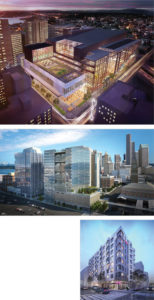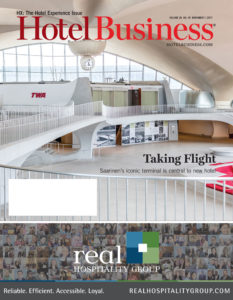SEATTLE—With its iconic Space Needle, majestic Mt. Rainier, funky Pike Place Market and scores of points of interest, Seattle has been a long-standing staple for destination-centric travelers.
But it’s things like the expansion of the Washington State Convention Center, the presence of Amazon, Google, Microsoft and Starbucks, along with the burgeoning biotech and health sectors that have been really causing some pulse-pounding moments for hotel developers.
“What Seattle has been experiencing the past several years has been described as an explosive combination of the 1896 Gold Rush and the 1962 Seattle World’s Fair, two events that changed our city and our future forever. That is happening now,” said Tom Norwalk, president/CEO of Visit Seattle, the city’s official destination marketing arm.
The CEO noted Seattle continues to outperform most of its competitive-set cities in terms of hotel demand, and growth has been driven based on record market results.
According to organization data, in 2014-2016, hotel occupancies were above 82%. In Downtown Seattle, ADR grew 9.6% in 2014, advanced 7.2% in 2015, grew 3.1% in 2016 and is projected to grow 7.4% this year.
There are 2,870 rooms under construction currently in the CBD, representing 25% of existing supply, all of which are slated to open in 2019.

TOP TO BOTTOM: The expansion of the Washington State Convention Center is a major factor in Seattle’s hotel growth.
A rendering of the Embassy Suites Pioneer Square
Marriott International is bringing a Moxy (shown) and Residence Inn to Seattle.
For hotel developers, the Emerald City has a lot of appeal. While there are no incentives offered from the city, Norwalk said Seattle has one of the most vibrant and diverse economies in the nation, all benefiting the travel and hospitality industry.
A major future demand generator will be the $1.6-billion expansion of the Washington State Convention Center. Slated to break ground in early 2018, its opening is scheduled for 2021. This comes on top of what Norwalk described as “robust and fast-growing international/overseas visitation” coupled with a “thriving and diverse business community producing record business-travel demand.”
The roster of corporations creating and drawing business runs the gamut from A to Z: Amazon, Boeing, Costco, Facebook, Google, Microsoft, Nordstrom, Redfin, Starbucks, Tableau, Zillow. There’s a boom in the biotech, aerospace, global health and medical sectors: Gates Foundation, Allen Institute, Fred Hutch Cancer Research. And the largest West Coast cruise port in North America, with more than 200 cruise ship sailings to Alaska, representing 500,000 visitors in 2017, adds to the mix of opportunity for hotels.
Norwalk said it’s mostly hotels in the upper-upscale segment coming in, and the majority are chain products. Among the largest is the Hyatt Regency Seattle with 1,260 rooms, followed by Hilton with the Embassy Suites Pioneer Square (282 rooms) and The Charter, (229 rooms) part of Hilton’s Curio Collection. Marriott International is onboarding a 302-room Residence Inn and a 146-room Moxy. Norwalk said nearly all projects are new-construction.
While last year was considered a robust period for adding hotel inventory in Seattle, the CEO suggested the pace has slowed due to 25% of existing supply being under construction. “However, there are still 24 projects in various planning stages with 3,900 rooms,” he said, noting, “The outlook is likely to slow based on absorption of existing new projects.”
Seattle is considered a high-barrier-to-entry market at this point, observed Norwalk. “Available land is scarce given the continued growth and expansion of Amazon and the technology sector in the CBD. Investment is focused on mixed-use and/or residential development with growing foreign investment,” he said.
Among the concerns hoteliers have about the market is its ability to absorb inventory, as well as increased competition from disrupters like Airbnb, said the CEO.
“The convention center addition is a major component in assisting that absorption,” said Norwalk. “Concerns from investors are based on cost of land and the time and permitting regulations (including high community benefit costs) that are needed for new projects. Availability of cranes is also a factor (there is a shortage due to 60-plus cranes being in use) and the challenge of labor shortage, based both on the increased cost of living and strong job growth in the region.”
Still, said the executive, “We are advocates for as much growth as practical in order to provide diverse options to all types of visitors—convention delegates, leisure and business travelers, etc. Currently, regulations, restrictions and taxes are in the process of being legislated on short-term rentals by our city council, which should legitimize and ease some hotelier concerns. Realistically though, there will be a pause beyond 2019 based on the demand cycle changing and the need to absorb the 25% increase in play right now.”
And, noted Norwalk, there are presently 2,000-plus rooms in construction phase in the Greater Seattle area outside of the central downtown core. HB

